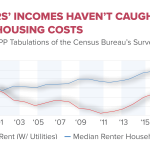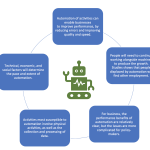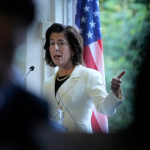Gina Raimondo has emerged as a prominent figure in American politics, significantly influencing the U.S. economy through innovative policies and strategic initiatives. As the former U.S. Secretary of Commerce and Governor of Rhode Island, Raimondo was instrumental in implementing the Infrastructure Investment and Jobs Act, a cornerstone of the Biden administration’s agenda. Her commitment to enhancing supply chain management and enhancing economic opportunities reflects her dedication to ensuring that everyday Americans thrive. Notably, she has championed initiatives that prioritize fiscal responsibility, asserting that for every public dollar invested, there should be ten private-sector dollars at play. With a focus on transforming challenges into opportunities, Gina Raimondo’s policies reflect a forward-thinking approach that aims to uplift the economic landscape across the nation.
Gina Raimondo, a transformative leader in U.S. governance, has played a critical role in reshaping economic strategies in the nation. As a key architect behind the Biden administration’s fiscal plans, her influence extends through significant legislation such as the Infrastructure Investment and Jobs Act. Known for her adept handling of supply chain dynamics, she fosters partnerships that bolster economic resilience and fortify the job market. Throughout her tenure, she has emphasized the importance of a balanced approach to policy-making, advocating for programs that promote growth while safeguarding the interests of working families. Overall, her contributions highlight a commitment to reinventing the American economic framework for long-term prosperity.
Gina Raimondo’s Vision for Economic Change
Gina Raimondo has consistently advocated for transformative economic policies that challenge the status quo. Her approach emphasizes the necessity of change in order to create a more equitable economy. Throughout her tenure as Governor of Rhode Island and later as U.S. Secretary of Commerce, she implemented significant reforms including tax cuts and enhanced wage standards aimed at uplifting the working class. Raimondo’s belief that effective change often requires ‘breaking things’ reflects a bold stance on economic management—one that prioritizes results over tradition.
In her discussions, Raimondo highlights the importance of ensuring that economic adjustments do not hurt vulnerable populations. This balance is crucial as she navigates through complex issues such as supply chain management and economic growth strategies. Her policies, particularly under the auspices of the Biden administration, are not only forward-thinking but are designed to be inclusive, providing opportunities for every American to benefit from economic advancements.
Impact of the Infrastructure Investment and Jobs Act
The Infrastructure Investment and Jobs Act represents a pivotal achievement in Gina Raimondo’s efforts to revitalize the U.S. economy. This transformative legislation was aimed at addressing the pressing needs of America’s infrastructure while simultaneously creating millions of jobs. By prioritizing investments in roadways, bridges, and modernizing public transit, Raimondo’s policies are set to enhance the country’s competitive edge on a global stage. Under her leadership, the act showcases a commitment to both economic recovery and environmental sustainability.
As Raimondo noted, fostering relationships with various countries and promoting domestic production is essential for enhancing the U.S. position in international markets. The act is designed to build resilience in U.S. supply chains, decreasing dependency on foreign countries for critical infrastructure and cutting-edge technology. This points to her adeptness at navigating complex economic landscapes while ensuring that American workers are at the forefront of these developments.
Strengthening Supply Chains Post-Pandemic
In the wake of the COVID-19 pandemic, Gina Raimondo emphasized the importance of understanding and revitalizing supply chains to support the U.S. economy. The pandemic exposed vulnerabilities that necessitated a strategic overhaul of how goods are sourced and delivered. During her term, she employed data-driven approaches to evaluate critical supply chains and subsequently engaged with international partners. This proactive involvement marked a significant shift towards enhanced supply chain resilience.
Raimondo’s initiatives to improve supply chain management have not only aimed at immediate recovery but also at long-term sustainability. By collaborating with countries in Southeast Asia and promoting the CHIPs and Science Act, she has underscored the necessity of domestic production in sensitive sectors such as technology and pharmaceuticals. Strengthening these supply chains is vital for maintaining national security and economic stability, reflecting Raimondo’s comprehensive perspective on modern economic challenges.
Biden Administration’s Commitment to Economic Growth
Gina Raimondo’s role in shaping the Biden administration’s economic policies accentuates a systematic approach toward ensuring sustainable growth. The administration’s initiatives, including substantial fiscal programs, seek to stimulate the economy while addressing critical issues such as employment and inflation. Raimondo has defended the economic stimulus, highlighting the importance of timely interventions to support unemployed citizens during crises.
Moreover, her acknowledgment of the need for childcare and workforce participation underscores a holistic strategy for economic rejuvenation. By integrating social programs into economic frameworks, Raimondo showcases the interconnected nature of economic health and community well-being—reaffirming her belief that comprehensive policy-making can lead to resilient recovery.
Economic Fairness and Opportunity in Leadership
Raimondo’s dedication to ensuring economic fairness and opportunity reflects her understanding of the systemic challenges many Americans face. As she notes, her motivation for entering politics stemmed from a desire to advocate for the ‘little guy’. This perspective informs her policies, focusing on uplifting marginalized communities and striving for an inclusive economic environment. Her journey from the daughter of immigrants to a top government official illustrates the potential for progress through dedicated public service.
Under her leadership, economic policies aim to dismantle long-standing barriers faced by the underprivileged. By advocating for minimum wage increases, access to education, and fair labor practices, Raimondo works tirelessly to create an economic landscape where everyone has a chance to succeed. Her approach demonstrates a commitment not only to economic growth but to the shared prosperity of all American citizens.
Challenges and Critiques in Political Decision-Making
Political decision-making, especially in a divided Congress, presents significant challenges that Gina Raimondo has navigated throughout her career. She candidly discusses the obstacles her team faced in effectively implementing policies amid partisan tensions. Despite various achievements, the path to enacting meaningful legislation is often fraught with compromise, leading to critiques from all sides about the effectiveness of their measures.
Raimondo is realistic about the imperfections inherent in politics, acknowledging that results take time and that every decision might not garner unanimous approval. Still, her ability to push forward substantial initiatives, like those in the Infrastructure Investment and Jobs Act, reflects her commitment to overcoming these challenges. She emphasizes that understanding the political landscape is crucial for achieving the necessary changes that ultimately benefit the broader economy.
Sustainability and Innovation in Economic Policy
Gina Raimondo’s policies reflect a forward-thinking approach that integrates sustainability with economic innovation. As the U.S. faces a critical juncture in dealing with climate change and resource management, she advocates for investments that not only spur economic growth but also protect the environment. This dual focus aims to establish a green economy that creates jobs while aiming for long-term ecological stability.
This commitment to sustainability is further underscored by her endorsement of advanced manufacturing technologies through acts like the CHIPs and Science Act. By prioritizing innovation, Raimondo seeks to position American industries at the forefront of the global economy while ensuring that the transition to cleaner energy sources is both economically viable and broadly beneficial.
Public Perception and Political Reality
Navigating public perception is a crucial aspect of Gina Raimondo’s role in leadership. Her ability to communicate complex policy decisions and their implications to the public is vital for fostering support and understanding. She recognizes that backlash and critique often accompany substantial reforms; thus, being transparent and approachable is crucial for maintaining public trust.
Raimondo’s approach to addressing concerns over inflation and economic stimulus reflects her willingness to engage with the public’s anxieties. By presenting detailed insights into the rationale behind policy decisions and the importance of comprehensive strategies, she works to build a narrative that resonates with both supporters and detractors. This balance plays a key role in shaping effective governance and ensuring the successful implementation of her policies.
The Role of Women in Economic Leadership
Gina Raimondo’s ascension to notable leadership roles not only showcases her capabilities but also highlights the critical role women play in shaping the U.S. economy. Through her position as Secretary of Commerce, she exemplifies the importance of female representation in high-ranking government roles and the unique perspectives women bring to economic challenges. Raimondo often advocates for policies that prioritize gender equity in the workforce, recognizing that inclusive economic growth cannot be achieved without the active participation of women.
By addressing barriers women face in the labor market, particularly in obtaining childcare support and equal pay, Raimondo champions initiatives that pave the way for a more equitable economy. Her commitment to this cause reinforces the idea that women’s empowerment is not just a social imperative but an economic one, vital for achieving robust and inclusive growth.
Frequently Asked Questions
What are Gina Raimondo’s key policies as Secretary of Commerce?
As Secretary of Commerce, Gina Raimondo focused on crucial policies including enhancing supply chain management, advocating for the Infrastructure Investment and Jobs Act, and improving the U.S. economy through strategic international partnerships. She emphasized the importance of collaboration in strengthening U.S. manufacturing while aiming for domestic production goals.
How did Gina Raimondo influence the U.S. economy during her tenure?
Gina Raimondo played a vital role in shaping the U.S. economy by implementing effective policies that reduced regulations and increased investment in infrastructure. Her work on the CHIPs and Science Act aimed at boosting domestic semiconductor production is a key highlight, focusing on addressing supply chain vulnerabilities and enhancing economic resilience.
What role did Gina Raimondo play in the Infrastructure Investment and Jobs Act?
Gina Raimondo was instrumental in the development and implementation of the Infrastructure Investment and Jobs Act, a cornerstone of the Biden administration’s efforts to revitalize America’s infrastructure and create jobs. Her leadership in this initiative underscores her commitment to building a better economy that supports all Americans.
How did Gina Raimondo address supply chain issues during the COVID-19 pandemic?
During the COVID-19 pandemic, Gina Raimondo focused on understanding and managing complex supply chains, creating spreadsheets to identify critical shortages. Under her guidance and President Biden’s leadership, efforts were made to strengthen international ties to mitigate supply chain disruptions and ensure the availability of essential goods.
What are Gina Raimondo’s views on free trade and competition with China?
Gina Raimondo advocates for fair trade practices, emphasizing that while free trade can benefit economies, it must be conducted under equitable conditions. She has expressed concerns about China’s non-compliance with trade rules, advocating for increased reciprocity to ensure a level playing field for American businesses in the global market.
How does Gina Raimondo view the impact of the stimulus package on inflation?
Gina Raimondo argues that while the stimulus package has faced criticism for contributing to inflation, it was essential in preventing prolonged unemployment during the COVID-19 crisis. She highlights the importance of supporting workers and families to maintain economic stability and recovery during challenging times.
What initiatives did Gina Raimondo support for improving workers’ access to jobs?
Gina Raimondo emphasized initiatives aimed at improving workers’ access to jobs through labor market strategies, such as childcare support, which help attract women into the workforce. She views these efforts not merely as social programs but as essential components for driving economic growth.
What were Gina Raimondo’s priorities during her time in the Biden administration?
Gina Raimondo’s key priorities during her tenure in the Biden administration included improving supply chain resilience, supporting the U.S. economy through infrastructure investment, and collaborating internationally to strengthen the nation’s industrial base while addressing challenges like cybersecurity and technological advancements.
| Key Points | Details |
|---|---|
| Changes for Improvement | Gina Raimondo emphasizes that positive change may require ‘breaking things’, which involves altering the status quo. |
| Tax and Minimum Wage | During her time as Governor, she cut taxes annually, raised the minimum wage, and made community college tuition free. |
| Regulatory Reduction | She successfully reduced state regulations by 30%. |
| Biden Administration Initiatives | Raimondo played a role in the Infrastructure Investment and Jobs Act and addressed supply chain issues during the pandemic. |
| Strategic International Relations | Emphasized forging friendships with other countries, particularly in Southeast Asia, under President Biden’s leadership. |
| CHIPs and Science Act | Aimed to enhance domestic semiconductor production to address reliance on foreign manufacturing, particularly from China. |
| Fiscal Responsibility | For every public dollar invested, $10 from the private sector was required, ensuring self-sufficiency in funding. |
| Criticism and Challenges | While she defended the Biden stimulus act against inflation criticism, she acknowledged the complexities of achieving political results. |
| Labor Market Initiatives | Programs aimed at attracting women into the workforce, with childcare as a crucial component for companies seeking employees. |
Summary
Gina Raimondo’s insights on economic reform highlight the necessity of embracing change while prioritizing the welfare of individuals. In her political journey, she has consistently advocated for fairness and opportunity, demonstrating a commitment to reshape the economy and labor market in ways that support average Americans. As she continues to influence U.S. policies, her focus on strategic initiatives not only addresses immediate challenges but also shapes a more inclusive future.










